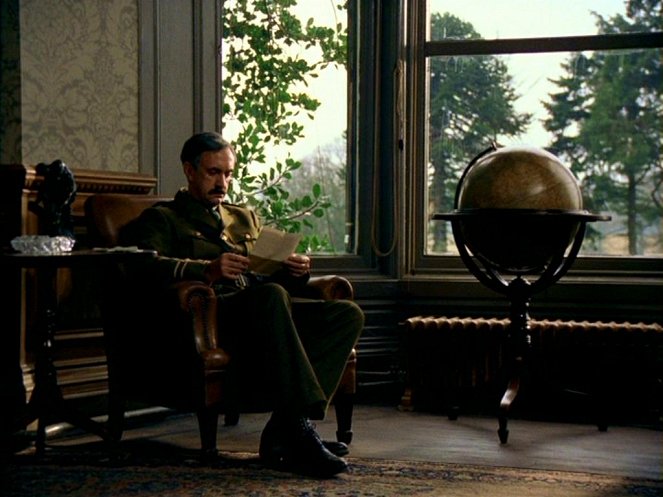Regie:
Gillies MacKinnonDrehbuch:
Allan ScottKamera:
Glen MacPhersonMusik:
Mychael DannaBesetzung:
Jonathan Pryce, James Wilby, Jonny Lee Miller, Stuart Bunce, David Hayman, Dougray Scott, John Neville, Julian Fellowes, Kevin McKidd, James McAvoy (mehr)Inhalte(1)
Ein Militärkrankenhaus in Edinburgh, 1917: Während die letzten Schlachten des Ersten Weltkriegs geschlagen werden, kuriert Psychiater William Rivers die Traumata der versehrt heimgekehrten britischen Soldaten. Er soll die Männer wieder diensttauglich machen und lässt sich dabei von den aufkommenden Lehren Freuds leiten: In intensiven Gesprächen versucht er, die Soldaten, darunter der junge Billy Prior und die beiden Dichter Wilfred Owen und Siegfried Sassoon, auf sanfte Art und Weise in die Realität zurückzuholen. In den Gesprächen mit Sassoon stellt Rivers schon bald fest, dass dieser offenbar bester Verfassung ist und keineswegs unter einem Kriegstrauma leidet. Er wurde als mental unstabil erklärt, weil er sich nach seinem Fronteinsatz in einem öffentlichen Plädoyer gegen den Krieg ausgesprochen hatte. Während Sassoon in Wilfred Owen einen Verbündeten findet, gerät Rivers wegen ihm unter politischen Druck: Er soll Sassoon davon überzeugen, sein Plädoyer zurückzuziehen und als die Worte eines Geisteskranken abzustempeln. Gelingt ihm das nicht, droht Sassoon eine Anklage wegen Landesverrats. (Verleiher-Text)
(mehr)Kritiken (1)
This film about World War I should have it quite easy because it depicts dramatic events from which countless stories can be drawn that take place on the edge. Unfortunately, this drama suffers from verbosity, and mediocrity, and is additionally affected by a socially limited perspective. It does not take place in the front trenches and does not depict bloody battles, but focuses on the psychological state of British officers in a sanatorium, where they are being treated for war trauma. It is a film shot from the perspective of the privileged people, who may bleed and die, but whose position is always incomparable to the experiences of the commoners in the trenches filled with filth, bugs, poor supplies, typhus, the stench of sweat, and urine. These privileged people do remember and sympathize with the ordinary soldiers, but it is the perspective of a nobleman who sympathizes with his subjects. The sanatorium is quite fancy, of course, because it is located in a castle estate, and there is plenty of time for philosophical contemplation, writing poems, and conversations about almost nothing. The war is only brought up in a few flashbacks of the horrors experienced and in the final farewell of the heroes in the epilogue. There are only two memorable scenes, one gruesome scene where a human eye ends up in the palm of a commanding officer, and then a scene of the German units surrendering on the front, where we see the exhausted resigned faces of fresh recruits and experienced war veterans. I'm only giving it a third star solely for the cast and the performances delivered by the actors. Overall impression: 50%.
()

